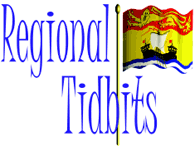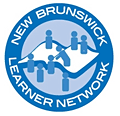- Read to Me!
- NETWORKS information
- Literacy for Women on the Streets
- Networks Datebook
- NALD's Software Evaluation Project launched
- Brigid Hayes receives NALD Award
- Adult Numeracy Frameworks
- The Literacy Bookshelf
- CABS Online
- Training for the Enhancement of Online Educational Resources
- Teaching Tips
- Regional Tidbits
- Calling all SARAW Programs
- Learner's Corner
- Learner's Story
- And, Among the Winners Were...
- Websites Worth Remembering
-
View in PDF
(3.7 MB) -
| NALD Networks | Volume 9 • Issue 1 |
 Members
of the newly formed NB
Learner Network attended their first
conference in September 2003. Eleven
adult learners representing literacy programs
across the province spent an intensive
two days learning about leadership.
Members
of the newly formed NB
Learner Network attended their first
conference in September 2003. Eleven
adult learners representing literacy programs
across the province spent an intensive
two days learning about leadership.
 Guest speakers included:
Guest speakers included:
- Terry Fearon from Leadership Lantica who spoke about the key role that attitude plays in leadership.
- Yvonne Westall, a learner with Laubach Literacy New Brunswick, delivered a workshop on public speaking and how learners can spread the literacy message.
- Donna Gordon, a retired government employee, reminded everyone that they had the power to change things in her workshop about self-advocacy.
- Dorothy Silver, the founder of Second Chance Learners presented ideas and tips on how to start a support group.
- Charles Ramsey of the National Adult Literacy Database (NALD) led learners through learning online websites.
The group met with Member of the Legislative Assembly, Jody Carr, and had a positive exchange with him about the learner’s need for stable funding for literacy in the province. Learners selected a logo for the New Brunswick Learner Network and developed a format for their newsletter and website. These will be launched soon along with a television commercial. Greg Clarke was elected chairperson of the network. He attends a CASP [Community Academic Services Program] in Fredericton. Greg is a learner rep to the Literacy Coalition and attends learner’s meetings in Ottawa where he meets learners from across the country. While in Ottawa, Greg met federal officials during Literacy Action Day on Parliament Hill October 23, 2003.
NALD played an important role in the establishment of the network, in that it contributed some used computers to learners, and also set them up with email accounts.
[This article was adapted with permission, from the Literacy News Bulletin, Vol.1, Issue 1, Fall 2003, published by the Literacy Coalition of NB.]
Calling all SARAW
Programs
If you are using a Speech Assisted Reading and Writing (SARAW) talking computer program, or know someone who is, we need to hear from you. SARAW is a talking computer program that helps teach basic reading, writing and math to adults with disabilities.
A new national project called the Literacy and Disability Study (LADS) is researching different models used to deliver literacy instruction to adults with disabilities using SARAW software. The LADS project will research a variety of instructional approaches used in different educational and community based settings, to students across a range of disabilities. An information guide will be produced describing these models and effective practices. The information guide will be distributed across Canada to adult literacy programs and rehabilitation agencies.
The Neil Squire Foundation is currently updating its database of existing SARAW programs. LADS Project Managers will be contacting programs by July 2004, and conducting short interviews in the fall of 2004. To ensure we have current information, please contact us if you know of a SARAW program operating in your area. Contact information below.
LADS is a project of Bow Valley College, Calgary AB and the Neil Squire Foundation, Burnaby BC, and is funded by the Government of Canada’s Social Development Partnerships Program.
Project Information
A 15-month research project that will:
- Produce a Literacy Fact Sheet on literacy and disabilities to increase awareness about the relationship between literacy and disabilities.
- Research existing SARAW programs for effective practices.
- Produce an information guide for SARAW program coordinators and instructors, literacy program coordinators and managers, rehabilitation workers and managers.
- Produce a booklet of stories by learners in SARAW programs.
Fact Sheet on Literacy and Disabilities:
- Highlight literacy rates and disabilities, and the need for literacy skills upgrading for adults with disabilities as well as the relationship between literacy rates and employment, income, and education.
- A preliminary fact sheet was completed in March 2004, and a finalized fact sheet will be completed in March 2005.
- The Movement for Canadian Literacy (MCL) will publish this Fact Sheet and add it to their collection of “Literacy is for Life” fact sheets series, available on their website: http://www.literacy.ca/litand/litand.htm
- The fact sheet will also be available on the NALD website (National Adult Literacy Database) and CAILC website (Canadian Association of Independent Living Centres) and at their 24 offices across the country.
SARAW programs
- On-site interviews (minimum 4 sites across Canada) and telephone surveys (approximately 50 programs) with students, coordinators, instructors, and tutors.
- The research will focus on current delivery models, program formats, settings, and effective practices, of SARAW (Speech Assisted Reading and Writing) programs across Canada.
- The results of the research will be produced as an information guide on effective practices for the SARAW program and will be distributed in the same way as the fact sheet.
- The information guide will be useful for SARAW program coordinators and instructors, literacy program coordinators and instructors, and rehabilitation workers and managers.
- Students stories will be gathered during the research and produced in a booklet, which will be useful for students in SARAW programs, and interested individuals with disabilities, their families and support circles.
- The research will be conducted from May to December, 2004, and the information guide and student stories booklet will be completed in March, 2005.
For more information please contact:
![]() - Audrey Gardner, Researcher
- Audrey Gardner, Researcher
Tel. (403) 410-1502
agardner@bowvalleycollege.ca
- Belle Auld, Project Manager
Tel. (403) 410-1503
belle_auld@eLit.ca